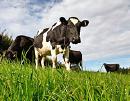 New Zealand’s farming leadership have not distinguished themselves in the debate about climate policy. Federated Farmers president Don Nicholson has called for NZ to set no target for emissions reductions and for agriculture to be excluded from the emissions trading scheme, and former vice-president Frank Brenmuhl is still ruminating on the need for more debate on basics:
New Zealand’s farming leadership have not distinguished themselves in the debate about climate policy. Federated Farmers president Don Nicholson has called for NZ to set no target for emissions reductions and for agriculture to be excluded from the emissions trading scheme, and former vice-president Frank Brenmuhl is still ruminating on the need for more debate on basics:
Political expediency has ensured the scientific debate has been reduced to a battle between believers and deniers.
No prizes for guessing Brenmuhl’s position… It gives me great pleasure, therefore, to point to an excellent analysis of agriculture’s role in the ETS by Adolf Stroombergen at Infometrics. He is scathing of Federated Farmers:
Once again we hear Federated Farmers bleating about the potential burden placed on them by an emissions trading scheme, proclaiming that farmers are doing all they can to reduce greenhouse gas emissions. Hence any carbon charge on agriculture would be pointless. Rubbish.
Stroombergen doesn’t mince his words:
Arguing that agriculture should not be part of this mechanism has as much merit as arguing that it should not pay ACC premiums linked to its accident rate, or that it should not face fines for polluting waterways.
Merit has seldom been a key feature of Federated Farmer’s arguments about emissions policy, but Stroombergen notes that:
The self-interested myopic hot air from some in the agricultural sector has fortunately been given little credence.
Perhaps Nicholson and Brenmuhl haven’t got the ear of the right people in the National Party. We should all be grateful for that.

 Government ministers have deliberately played down the role of forestry in meeting emissions targets, documents released under the Official Information Act suggest.
Government ministers have deliberately played down the role of forestry in meeting emissions targets, documents released under the Official Information Act suggest.  Could New Zealand agriculture be part of the solution to climate change? We know all too well that it is part of the problem – and that’s not an accusation, by the way, just a recognition. But problems are there to be tackled, and what is called carbon farming looks like one way in which agriculture can substantially contribute to climate change mitigation and at the same time improve the soils on which it depends.
Could New Zealand agriculture be part of the solution to climate change? We know all too well that it is part of the problem – and that’s not an accusation, by the way, just a recognition. But problems are there to be tackled, and what is called carbon farming looks like one way in which agriculture can substantially contribute to climate change mitigation and at the same time improve the soils on which it depends.